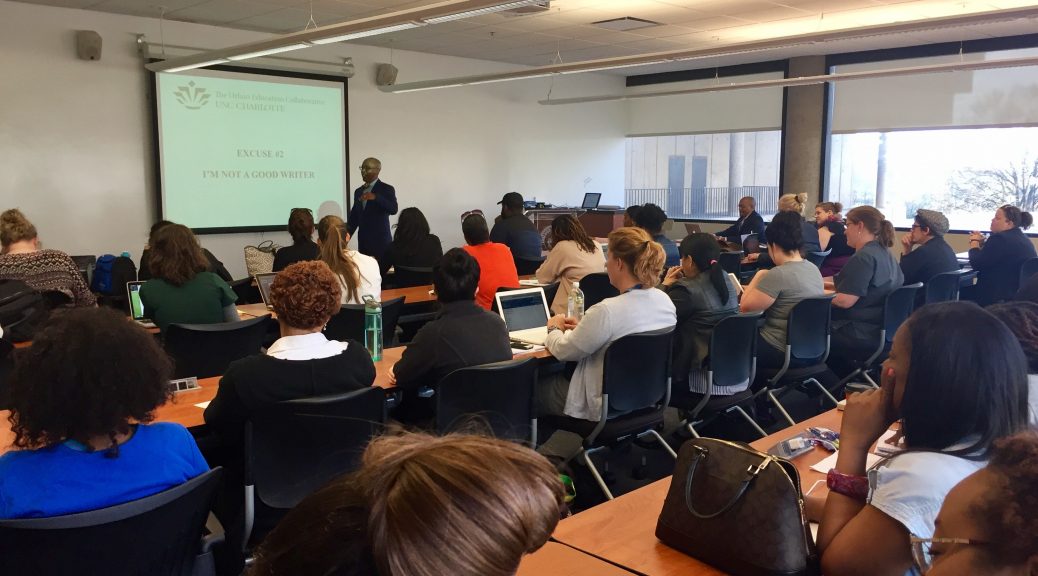By K. Dawn Rutledge
NASHVILLE, Tenn. (TSU News Service) – Tennessee State University graduate students received some sound advice on how to become better writers from two top scholars regarded as leaders in their fields, and received the gift of a major opportunity to get a jump-start on their publishing careers.

University of North Carolina at Charlotte professors, Dr. Chance Lewis, a Carol Grotnes Belk Distinguished Professor and Endowed Chair of Urban Education and director of the UNC-Charlotte Urban Education Collaborative, and Dr. Stephen Hancock, associate professor of Multicultural Education with the Urban Education Collaborative, were invited to TSU as part of Title III’s Graduate Student Speaker and Workshop Series created by Dr. Andrea Tyler, director of Graduate Student Services.
Lewis and Hancock have crafted highly efficient research programs that tap into the writing strengths of graduate students to maximize their publication output. They shared their expertise March 28 and 29 with graduate students, undergraduate students and faculty revealing strategies on how to find passion, eliminate distractions, practice self-discipline, and reduce stress in the writing process.
“You have to understand the why related to becoming a strong and prolific writer,” Lewis said, adding that students should discover what they are passionate about. “Something must bother you so much that your why is focused on solving that issue. You must have a takeover mentality, a desire to be a key contributor in your field and be the best at it.”
During the presentation, Lewis, founder and editor of the Urban Education Research & Policy Annuals (UERPA), a graduate student journal published annually by the Urban Education Collaborative UNC-Charlotte, spontaneously offered TSU an entire special edition journal for master and doctoral-level TSU students to submit empirical and theoretical research in areas related to urban education. Founded in 2012, the UERPA is a double-blind peer-reviewed journal published once a year, and includes original articles, brief reports, and book reviews in the areas of educational reform, educational equity for underrepresented groups, racially diverse perspectives, multiculturalism, teacher education models, student achievement, urban school populations, and academic and social needs for urban students, among other topics related to research, policy, or practice in urban education.
TSU’s Dr. Andrea L. Tyler, director of Graduate Student Services and Research Associate, will oversee the process.
“This TSU special themed issue will provide an in-depth analysis of the educational issues in urban settings and how K-12 and higher education professionals and stakeholders can work to promote student success, academic achievement, and increase access to higher education to improve the academic achievement of students in urban educational settings,” said Tyler, who has already established a pilot research writing group for TSU graduate students.
“The pilot writing group is for graduate students who can make a serious commitment to writing and publishing in their respective fields,” she added. “The goal of the program is to help strengthen students’ writing abilities, provide a structural environment to refine skills and, most importantly, publish.”
Erin Carney, a first-year Ph.D. student in the Counseling Program, said the writing seminar helped to rekindle her interest in publishing as a graduate student.

“Like most higher education programs, Ph.D. programs at TSU are demanding on your time and energy,” said the West Lafayette, Indiana native. “Drs. Lewis and Hancock gave practical advice on how students can balance being productive with the other aspects of our lives. They reminded us that, when we are overwhelmed with school obligations, we have to stay focused on what we came here to do – change our field for the better.”
Academia is highly competitive, and publishing often determines which doctoral students stand out and separate themselves when seeking academic positions and advancing in their respective fields. TSU offers doctoral degrees in seven areas: biological sciences, psychology, public administration, curriculum and instruction, educational leadership, computer information systems engineering, and physical therapy.
“[In academia] You will only be known by what you produce,” Lewis said. “You have to build a brand of your scholarly work.”
The Graduate Student Speaker and Workshop Series also focused on faculty engagement with a session for faculty advisors centered on increasing the efficiency of publishing by using the writing strengths of students.
Dr. Clara Young, chair of the TSU Department of Teaching and Learning in the College of Education, said she thoroughly enjoyed the concepts and ideas shared by the presenters.
“One of the major challenges in a graduate program is scholarly writing,” Young said. “Many graduate students enter graduate studies with limited experience in scholarly writing. As such, it becomes the responsibility of faculty to help students develop scholarly writing skills. I believe the Graduate Writing Seminar provided perspective on how faculty can begin to facilitate the scholarly writing process with graduate students.”
Department of Media Relations
Tennessee State University
3500 John Merritt Boulevard
Nashville, Tennessee 37209
615.963.5331
About Tennessee State University
With more than 9,000 students, Tennessee State University is Nashville’s only public university, and is a comprehensive, urban, co-educational, land-grant university offering 38 undergraduate, 25 graduate and seven doctoral programs. TSU has earned a top 20 ranking for Historically Black Colleges and Universities according to U.S. News and World Report, and rated as one of the top universities in the country by Washington Monthly for social mobility, research and community service. Founded in 1912, Tennessee State University celebrated 100 years in Nashville during 2012. Visit the University online at tnstate.edu.
